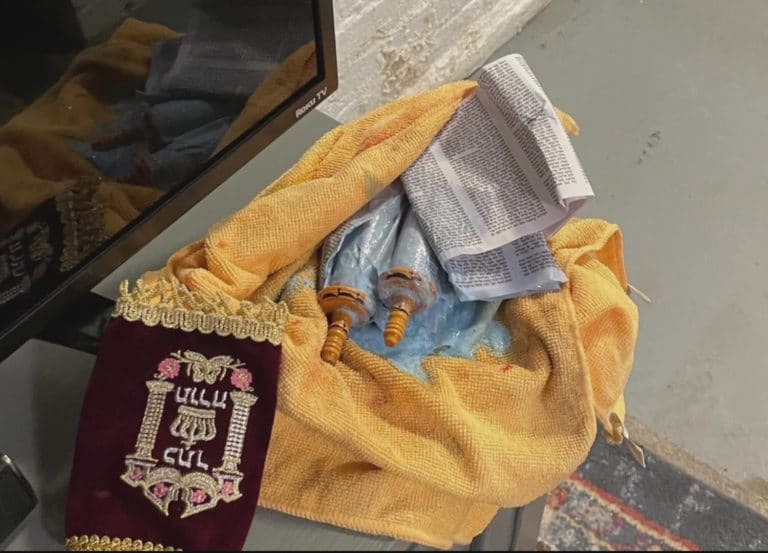
We have been talking a lot about antisemitism this week.
From the destruction of a replica Torah at George Washington University…
@jewishunpacked A fraternity house at GW was broken into & vandalized. Their replica Torah was ripped apart & had detergent poured over it. Then this happened:
♬ Runaway by Kanye Piano – Henry Cantu
To a (hotly debated) report that found 1 in 4 U.S. Jews experienced antisemitism this past year.
WATCH NOW:
— American Jewish Committee (@AJCGlobal) October 28, 2021
1 in 4 🇺🇸 Jews have been the targets of antisemitism over the past 12 months, AJC’s new #AntisemitismReport revealed.
Join AJC's @HHuffnagleAJC and @AviMayer as they examine the state of antisemitism in the U.S. and what can be done about it.https://t.co/I0FAFZrRJp
To turning on the TV and seeing Rachel Maddow talking about the Holocaust with the lawyer suing the Charlottesville Nazis (which then started to trend on Twitter).
But also this week we saw:
- A fire was started outside of a synagogue in Austin, Texas (one of many recent antisemitic incidents in the Texan capital)
- An antisemitic sign making light of the Holocaust was posted outside an autoshop in Texas
- A Canadian survivor talked to the CBC about how antisemitism in the country is becoming more visible
- An antisemitic sign was posted on the campus of Arizona State University
- This Phoenix school board meeting: https://twitter.com/MikeSington/status/1454215827767521285
- Antisemitic graffiti was painted on a San Diego high school
- Antisemitic flyers were delivered to homes in a Texas town
- A top official at a Dutch TV station resigned over antisemitic comments
- A French court fined 7 people for antisemitic abuse targeting the runner up of Miss France
- A mezuzah was torn down from a building on a college campus in Boston
- A lawsuit accuses a Ohio high school coach of using antisemitic language
- Anti-Jewish graffiti was painted on a parking deck in a suburb of Charlotte, North Carolina
- A Kansas lawmaker compared Covid restrictions to the Holocaust
- A Florida state senator shared voicemails of antisemitic threats against her
- A man was convicted for attacking a rabbi in Brooklyn
And that’s just what was reported on by the English speaking media in the last 7 days.
Needless to say, it’s been a week.
Now, here’s the part where we usually see a pivot in articles like these. This usually is the paragraph where those of us in the Jewish media try to make a bigger point out of all of these antisemitic incidents.
For me, in my article, this is the part where I’m just going to say— I’m tired. My goal is to just say just that (and one other thing).
I’m here to say that we can recognize antisemitism and not make a larger argument on what’s happening.
I’m here to say I know it’s hard to decipher what is noise and what is actually a threat to our existence despite what the experts are saying.
That’s the thing with antisemitism it affects us on both a micro and macro scale. It affects us and then again it doesn’t directly unless it happens directly to us or our community. This is why we often need the big picture analysis, but often it comes off as too clinical or political.
Next week we mark the anniversary of Kristallnacht, or the Night of Broken Glass. A moment often invoked when modern antisemitism happens.
Before we got to Kristallnacht thousands of incidents like the ones listed above happened. But also, thousands of incidents have happened since then and thank Gd we haven’t seen another night like the nights of November 9th and 10th, 1938.
Our Arson Investigators need your help! They're looking for this man in connection with a fire set at Congregation Beth Israel (3901 Shoal Creek Blvd.) on October 31.
— Austin Fire Dept (@austinfiredept) November 3, 2021
If you have any information, please contact our Investigations Office at (512) 974-0240. pic.twitter.com/zlJfwAiEMX
A string of antisemitic incidents in Austin may have nothing to do with what’s happening globally with antisemitism but for the Austin Jewish community it is a very real and felt threat. At face value Texas is having a bit of an antisemitic moment. Why? We should also talk about this without pointing out national and global trends.
The footage of today’s Torah Reading and Solidarity Rally at GW is moving beyond words. This is so beautiful to see at my Alma mater. Raise high. pic.twitter.com/sHDCOMpR3K
— Blake Flayton (@blakeflayton) November 2, 2021
What happened at GW can be talked about without trying to make a point about antisemitism on college campuses. We can simply say: “This is not good and we should do better together, all of us” and not make this about liberal or conservative values.
If you’re a Jewish kid in Rock Hill, South Carolina, a large suburb of Charlotte, North Carolina which has a sizable Jewish population (the state’s largest city and a place I called home for years), I can tell you nobody wants to debate the bigger picture right now– their community is feeling the ramifications of an idiot’s decision to publicly voice their feelings towards the Jews.
We need to also talk about antisemitism on a micro scale. That’s part of how we can combat it. We are very good at pointing out that there is a bigger community issue at stake when these incidents happen but we often ignore what’s happening on the local level and that’s not fair to the communities who are experiencing this hatred.
The FBI Hate Crimes Report shows that antisemitism is a local problem (most of the incidents happened in a community to a person who called it home) but we continue to report on antisemitism in aggregate as a cohesive national problem.
There may not be a national fix to antisemitism. The solution to what’s happening in Texas may look very different to combating antisemitism in New York or South Carolina.
We are all too quick to forget these individual cases because we are looking at the larger picture and for quick solutions (if only the conservatives or liberals understood) but left behind are communities that are living with these bigots in their own backyards. There isn’t a national fix for your antisemitic neighbor.
